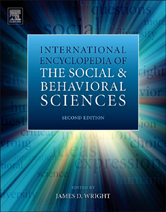Bibliographies, Literature Reviews, and Reference Books :: Like Asking an Expert
The tools and tips on this page are for when you've searched in the databases and catalogs and you either can't find anything on your topic or there is way, way too much and no clear way to narrow it down.
Too Much: use literature reviews and bibliographies like asking an expert to summarize the research in a given area then point out to you the works most relevant to your work. They can help you understand the contribution of an unfamiliar area of research or theory to your topic and direct you to influential and relevant scholarship.
Too Little: when you can find no research on a topic, usually the best next step is to broaden your search. Trouble is, when you are new to an area of research, it can be hard to know into what categories your work fits. Complicating the matter, once you broaden your approach, things can get overwhelming quickly. Unlike journal articles, reference books and literature reviews can be found on very broad concepts, which can be read quickly and suggest new paths to try.
Of course, you can always contact Kristin to talk through these questions!
Bibliography and Literature Review
Annotated bibliographies and literature reviews written by recognized experts are incredibly helpful for understanding a body of literature that you cannot possibly have read yet as an undergraduate. Use these to help understand the context into which your topic fits.
-
Oxford Bibliography of Sociology
Publication Date: 2011Offers bibliographies of current scholarship in topics across the subfields of sociology. Example articles include Aging, Gentrification, Middle Class, Medical Sociology, and Welfare States.
Selected Reference Titles
Encyclopedias and other general reference titles are used to get an overview of a topic written by a specialist, find related terms that will apply to your topic, or identify a selected bibliography.
-
 Encyclopedia of Sociology
by
Call Number: CC Reference HM425 .E5 2000 v. 1-5Availability and more information from Catalyst...
Encyclopedia of Sociology
by
Call Number: CC Reference HM425 .E5 2000 v. 1-5Availability and more information from Catalyst...
2nd ed. Offers overviews of topics including major debates and issues; selected bibliography at the end of the entry. -
 International Encyclopedia of the Social & Behavioral Sciences
by
Call Number: H41 .I58 2001 v.1-26 (and online 2015 ed.)Availability and more information from Catalyst...
International Encyclopedia of the Social & Behavioral Sciences
by
Call Number: H41 .I58 2001 v.1-26 (and online 2015 ed.)Availability and more information from Catalyst...
Twenty-six volumes of entries in the form of short reviews of the literature in specific areas in the social sciences. Very useful bibliographies. -
International Encyclopedia of Social Sciences by
Call Number: REF H40.A2 I5 2008ISBN: 9780028659657Publication Date: 2007-11-09Availability and more information from Catalyst...
A revised edition of the famous set edited by David Sills, this nine volume set offers synoptic essays and concise bibliographies. -
 A Dictionary of Sociology
by
Call Number: CC Reference HM425 .D5735 2005Availability and more information from Catalyst...
A Dictionary of Sociology
by
Call Number: CC Reference HM425 .D5735 2005Availability and more information from Catalyst...
Available both in print in the reference collection and online. -
 Encyclopedia of Social History
by
Call Number: CC Reference HN28 .E53 1994Availability and more information from Catalyst...
Encyclopedia of Social History
by
Call Number: CC Reference HN28 .E53 1994Availability and more information from Catalyst... -
Key Sociological Thinkers by
Call Number: CC Reference HM51 .K43 2008ISBN: 0230001564Publication Date: 2007-11-06Availability and more information from Catalyst...
As key thinkers are referenced in the texts you read, a book like this can help you understand their significance to the field.
Specialized Reference Books
Reference books are not always scoped to entire disciplines or subdisciplines. They can also pull together research on specific topics like these:
-
Polling America by
Call Number: CC Reference HN90.P8 P645 2005 v.1-2ISBN: 0313327017Publication Date: 2005-06-30Availability and more information from Catalyst... -
 Science, Technology and Society: An Encyclopedia
by
Call Number: CC Reference HM846 .S43 2005 and OnlineAvailability and more information from Catalyst...
Science, Technology and Society: An Encyclopedia
by
Call Number: CC Reference HM846 .S43 2005 and OnlineAvailability and more information from Catalyst...
Companions, Handbooks, Anthologies
-
The Blackwell Companion to the Sociology of Families by
Call Number: CC Books HQ519 .B53 2004 and OnlineISBN: 0631221581Publication Date: 2003-12-05Availability and more information from Catalyst...
"Companion" books can be great aids when beginning research in an area of Sociology. Their synaptic essays provide a picture of the state of research and their bibliographies point you to the most important texts. -
 Handbook of the Sociology of Gender
by
Call Number: CC Reference HQ 1075 .H36 2006Availability and more information from Catalyst...
Handbook of the Sociology of Gender
by
Call Number: CC Reference HQ 1075 .H36 2006Availability and more information from Catalyst...
Written from a sociology perspective, but the essays and especially the bibliographies can be helpful.
How do you find such books on your topic of interest? I'm so glad you asked. See this

